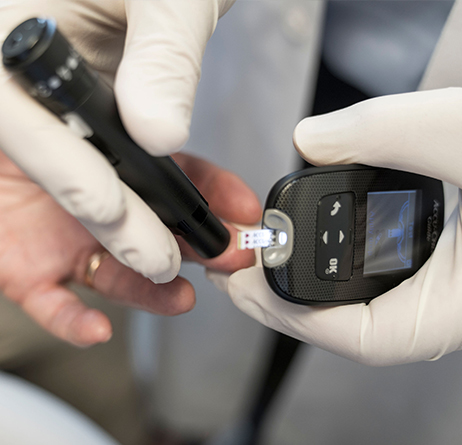As a board-certified endocrinologist, Dr. Alexander Lurie provides individualized care to patients diagnosed with type 1 and type 2 diabetes.
Diabetes is a disease that affects the way the body uses glucose, or sugar, in your blood. Derived from the foods we eat, glucose is a major source of energy, fueling the body’s function. Your body needs the hormone insulin to move glucose out of the bloodstream and into your cells. People with diabetes are either unable to produce, do not produce enough of it, or the insulin they have doesn’t work the way it should. If there is not enough insulin or your body can’t use it correctly, glucose builds up in the blood, which can cause both immediate and long-term problems.

Type 1 Diabetes
Type 1 diabetes is an autoimmune disease, meaning that your immune system mistakenly attacks your pancreas and destroys the cells that manufacture insulin. If you have type 1 diabetes, your body no longer makes insulin, so it has to be replaced with multiple daily injections or by wearing an insulin pump.
No one knows exactly what causes type 1 diabetes. There is no cure, it cannot be prevented, and you do not grow out of it. Type 1 diabetes is not contagious, so it can’t be acquired from another person or passed along to anyone. Nor is it caused by eating too much sugar. Instead, it is believed to be a genetic disorder or triggered by a virus, imbalance in gut bacteria, or another autoimmune disorder.
Maintaining good control of your blood sugar is critical in preventing short- and long-term complications. Dr. Lurie can help you manage blood glucose levels by adjusting your insulin dosage, but it’s important to check your blood sugar multiple times a day and give yourself insulin whenever your blood glucose is high or anytime you consume food or drinks with carbohydrates.
Type 2 Diabetes
Type 2 diabetes is a metabolic disorder. Unlike type 1 diabetes, the pancreas can still produce insulin, although it either doesn’t make enough or your body doesn’t respond to it properly. As a result, your blood sugar levels build up and you become sick if not treated.
Risk factors for type 2 diabetes include being overweight or obese, leading a sedentary lifestyle, family history of the disease, high blood pressure, and high cholesterol. Also, type 2 diabetes is more common among those of African, Hispanic, Asian, and Native American descent.
Treatment for type 2 diabetes typically begins with oral medication, along with weight loss, healthy diet, and exercise. You may eventually need insulin injections to regulate your blood sugar. It’s critically important to manage your blood glucose levels to prevent complications such as heart disease, eye disease, kidney disease, nerve damage, poor circulation in the feet, and foot problems such as ulcers and infection.
Dr. Lurie works with a dedicated team of diabetes educators and nutritionists to help manage type 1 and type 2 diabetes. Together we can provide guidance for patients on oral medications, insulin injections, insulin pumps, and continuous glucose monitors (CGM).
PATIENT FEEDBACK
“Dr. Lurie is very professional and takes the time to listen to the patients concerns and answer questions regarding care. It’s always a pleasure to visit Dr. Lurie because he really cares about his patients.”
“He is an excellent doctor. He actually takes his time to review your health history and is really patient when it comes to asking questions. His office staff are friendly and kind. I recommend him 100% to anyone looking for an endocrinologist”
“I totally recommend Dr. Lurie to any of my friends or family members. He is a glentleman, a caring doctor that knows how to listen and to remember details about his patients. I fully trust admire his knowledge and professionalism.”


